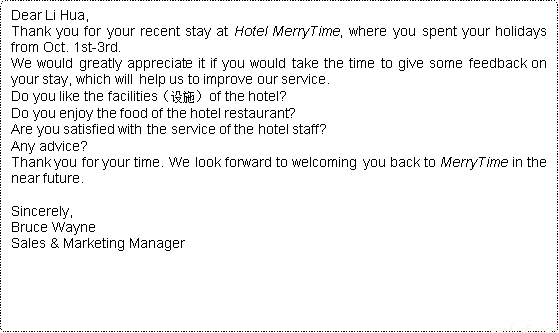
�������
�ٶ��������ǰ�������ù�����������������沢��סij���������Ƶꡣ�����ǾƵ���⼮����Mr. Wayne��������㷢�����������(feedback)�ĵ����ʼ������������Ҫ��дһ����ʣ�
1. �Ա��ξƵ���ס�����ʾ�϶���
2. �Ƶ���ڹ��������ṩ���WiFi��������WiFi�շѹ��ߣ�ϣ���Ľ���
3. ףԸ�Ƶ�Խ��Խ�á�

ע�⣺1. ����120���ң�
2. �����ʵ�����ϸ�ڣ���ʹ�������
3. �ʼ���ͷ�ͽ�β��Ϊ��д�ã������������
Dear Mr. Wayne,
Thank you for your E-mail and I am glad to give feedback on my recent stay at Hotel MerryTime.
__________________________________________________________________________________
__________________________________________________________________________________
__________________________________________________________________________________
__________________________________________________________________________________
__________________________________________________________________________________
__________________________________________________________________________________
Regards,
Li Hua
 ���Ӣ��������ϵ�д�
���Ӣ��������ϵ�д�
| �꼶 | ���пγ� | �꼶 | ���пγ� |
| ��һ | ��һ��ѿγ��Ƽ��� | ��һ | ��һ��ѿγ��Ƽ��� |
| �߶� | �߶���ѿγ��Ƽ��� | ���� | ������ѿγ��Ƽ��� |
| ���� | ������ѿγ��Ƽ��� | ���� | ������ѿγ��Ƽ��� |
��Ŀ������Ӣ�� ��Դ��2016����Ϻ����ص�һ��ѧ����3���¿���һģ��Ӣ���Ծ��������棩 ���ͣ��Ķ�����
Black History Month is also known as the African-American History Month. It is celebrated all over the United States of America and Canada in the month of February, while in the United Kingdom it is celebrated in October. Each and every school and university conducts various activities to make the generation aware of the importance that African-American history holds in the nation. The electronic media is filled with themes in relevance to the occasion, and many activities are carried out across the country to remember the contribution made by African-American citizens in the development of this nation.
Black History Month was first started by a famous African-American historian Dr. Carter G. Woodson in the year 1926. February was chosen as the month to celebrate the African-American history because it was the birth month of two of the most highly valued people among African-Americans. These were President Abraham Lincoln, who freed the slaves, and Frederick Douglass, who was also the first vice presidential nominee (��������) among African-Americans. Initially, Black History Month was known as the ��Negro History Week��. This was Dr. Woodson��s attempt to encourage awareness among citizens about the contribution of African-Americans towards the building of the nation. It was only in the early 1970��s that the name ��Negro History Week�� changed to ��Black History Month��. And later, in the year 1976, the entire month of February was declared to be the National African-American History Month, or the Black History Month.
Every year, National African-American History Month is celebrated by many activities with various ideas and themes for the younger generation. In 2013, Black History Month celebrates the 50th anniversary of the March on Washington at which Martin Luther King, Jr. gave his famous speech ��I have a dream��. It also marks the 150th anniversary of the Emancipation Proclamation (��ź�ū����). The theme for Black History Month in 2014 is ��Civil Rights in America�� remembering the important milestones by African-Americans and others in the battle for civil rights and equal treatment under the law.

1.What is the purpose of Black History Month in America?
A. To remember African-Americans�� contribution to America.
B. To remember the history of African-Americans in America.
C. To encourage African-American children to study hard.
D. To increase African-American children��s confidence.
2.February was chosen as Black History Month because ________.
A. Dr. Carter G. Woodson liked February.
B. slavery was officially ended in February.
C. African-Americans contributed a lot in February.
D. two great American leaders was born in February.
3.How is the second paragraph developed?
A. By giving examples.
B. By following time order.
C. By making comparisons.
D. By making classifications.
4.What does Black History Month in 2014 celebrate in America?
A. The 50th anniversary of the March of Washington.
B. Martin Luther King��Jr��s speech ��I have a dream��.
C. The 150th anniversary of the Emancipation Proclamation.
D. Important people and occasion in the battle for civil rights.
�鿴�𰸺ͽ���>>
��Ŀ������Ӣ�� ��Դ��2016���Ĵ�ʡ������ѧ����ѧ����Ӣ���Ծ��������棩 ���ͣ��������
�������
�������ǹ�����ѧ��ѧ�������֪����ij��ѧ��ʷ�ƾã��γ����������뵽��УӢ��ϵѧϰ������ݱ�����Ϣ����Ӣ��дһ���Լ��š�
������Ϣ | �У�17�꣬�����꼶ѧ�� |
�Ը���DZ�� | ���ʣ�ϲ�����˽����������õ��ŶӾ�����Ӧ����ǿ |
ѧϰ������ | ѧϰ�̿࣬�ɼ�����ǰé ����ѧУӢ���ݽ�����һ�Ƚ� |
ע�⣺ 1������100���ҡ� 2���ŵĿ�ͷ�ͽ�β�Ѿ�������
��ʾ�ʣ�Ӣ���ݽ�������English Speech Contest
Dear Sir��
My name is Li Hua from Guang Ming High School in Beijing, China.
________________________________________________________________________
________________________________________________________________________
________________________________________________________________________
________________________________________________________________________
________________________________________________________________________
________________________________________________________________________
Looking forward to your early reply.
Yours��
Li Hua
�鿴�𰸺ͽ���>>
��Ŀ������Ӣ�� ��Դ��2015-2016ѧ�������������ҵ�ֵ�һ��ѧ�߶���ѧ����ĩӢ���Ծ��������棩 ���ͣ��Ķ�����
A new word has suddenly become wildly popular in China����tuhao����which loosely means ��nouveau riche��. There have been more than 100 million references to the word ��tuhao�� on social media since early September.
It��s being used to describe everything from the new people��s daily building, to expensive celebrity weddings full of millionaires, and the new gold-colored iPhone.
In Chinese ��tu�� means earth and ��hao�� means rich. To say someone is tuhao is to imply they come from a poor peasant background, and have made it rich quickly��but don��t quite have the manners to go along with it. ��It��s like the term ��nouveau riche����, says Professor Steve Tsang at the School of Contemporary Chinese Studies in Nottingham, ��but has even more negative meanings, suggesting a certain vulgarity(����).��
��Tuhao�� is actually an old word, dating back perhaps as far as the Southern Dynasty��1,500 years ago, but it has always meant something rather different. During the communist revolution, from the 1920s to early 1950s, it was widely used to refer to landholders and gentry(����)who would often do bad things to those beneath them.
This new usage of the term took off in September after a widely-shared joke about a rich, but unhappy man, who goes to a Buddhist monk for advice, expecting to be told to live a more simple life. The monk replies instead with a sentence, ��Tuhao, let��s be friends!��
Chinese Internet users are highly creative in their use of language, and are constantly inventing, and re-inventing words as a way of getting past censorship(���) rules. But in this case, its popularity seems to be down to the fact that it expresses China��s changing society so well��many people sneer at those with wealth, but are secretly jealous.
1.What is the best title of the passage?
A. Tuhao, a newly popular word in China
B. The long history of Tuhao
C. The new usage of Tuhao
D. Tuhao, a newly-invented Chinese word
2.Which of the following may NOT be considered ��tuhao��?
A. A vulgar nouveau riche.
B. A landholder.
C. A quick-rich peasant without proper manners.
D. A Buddhist monk.
3.The last but one paragraph mainly tells us ________.
A. what the new usage of the word is
B. how the word becomes popular again
C. why the unhappy man went to the Buddhist monk
D. what advice the monk gave the unhappy man
4.What does the underlined word in the last paragraph mean?
A. Respect. B. Envy. C. Laugh. D. Disbelieve.
�鿴�𰸺ͽ���>>
��Ŀ������Ӣ�� ��Դ��2016���Ĵ�ʡ����12���¿�Ӣ���Ծ��������棩 ���ͣ���ѡ��
���ݶ������ݣ��Ӷ��ĺ��ѡ����ѡ��������հ״������ѡ�ѡ����������Ϊ����ѡ�
If you think about your circle of friends and family members, you can certainly pick out one or more people who are not good listeners. 1. If you��re fortunate, that person is a good friend, a loved one or a teacher.
All too often, we associate the benefits of good listening skills with achieving very specific outcomes, like following the boss��s orders (aimed at getting a job promotion).
2. We think of them as something basic, which we mastered in our formal schooling, along with dictation and obeying instructions, etc. This is a shame. We should know listening skills are the focus of lifetime learning and development, related to our communication skills.
3. All of these occur because two people or groups don��t listen to each other. We don��t analyze the root problem, or work on improvement steps.
We still tend to treat listening skills the way we treat learning to walk: we think that once we��ve acquired them, we��ve got them. We are ready to move on to the next thing. Wrong. 4.
Poor listening skills often damage effective dialogue between people. 5. If we were able to reduce misunderstandings in our conversations by 20-30%, there would be benefits in efficiency and the elimination (����) of tiresome repetition.
A. However, think about the upside potential.
B. We��re surrounded by this kind of outcome.
C. We tend to undervalue the importance of our listening skills.
D. Think about the number of failures, misunderstandings and arguments.
E. Equally you can think of someone you know who is a very good listener.
F. The challenge of listening is determining when the speaker wants a response or advice.
G. The problem is that people and language are far more complex than the roads we travel on.
�鿴�𰸺ͽ���>>
��Ŀ������Ӣ�� ��Դ��2016���������Ͽ������ѧ������ѧ�ڵ�һ��ǿ��ѵ��Ӣ���Ծ��������棩 ���ͣ��Ķ�����
Every year, millions of Americans see their personal information leak into the wrong hands. Maybe there��s spyware on the their computer, or a service they use suffered a security reach, leaving customers at the risk of exposure. Or perhaps their password is easy to guess.
Don��t fear: You can easily set up proper defenses. Here��s how.
�� Clean Your Computer and Smartphone
Before you put new security measures into place, make sure your devices are as spotless as possible. This means installing a good antivirus program and taking the time to clear out any spy �� or malware that may have already infected your system. These days, it��s also worth it to make sure your phone is safe from viruses. Iphones are less likely to be targeted by spyware, but Android users should download the Lookout app to scan their devices and ensure everything is as it should be.
�� Secure Your WiFi.
It��s fairly easy for potential criminals to gain access to your information if they��re able to share your connection �� that��s why you want to be careful when using public WiFi. Even though you put security measures into place a couple of years ago, it��s a good idea to refresh your settings.
�� Use passwords
What you��ve heard is true: Passwords should use a variety of special characters, numerals, letters, and cases when possible.
�� Check the shopping security
Take care when shopping online. Always check the security symbols when using an online site for shopping. If the lock icon encryption (����) is not there, do not give out credit details. Also, check that the site is legal �� never go to a site from a random email and start shopping online.
Keep a separate credit card just for online shopping. This will make it easier to cancel if something bad does happen and your other credit card for ��in real life�� can still be used uninfluenced.
Don��t store information on any store��s website. It may be convenient but it��s also a possible loss to you if the site is hacked.
1.This passage is mainly about ___________.
A. ways of avoiding identity theft
B. tips of freeing computers from viruses
C. measures to ensure network security
D. steps to keep track of passwords
2.To put new security measures into place, we need to ___________.
A. clear out everything in the system
B. make a random selection of network
C. get rid of potential spyware
D. refresh the infected system
3.According to the passage, the risk of exposing personal information may possibly be caused by ___________.
A. the applications of antivirus programs
B. the practice of using public WiFi
C. the difficult access to passwords
D. the separate credit card for online shopping
4.Which of the following is an improper way to shop online?
A. Adopting a unique password for every website.
B. Shopping online at reliable websites.
C. Keeping credit details safe by checking security symbols.
D. Monitoring credit card by storing information online.
�鿴�𰸺ͽ���>>
��Ŀ������Ӣ�� ��Դ��2015-2016ѧ�����һ��«̨һ�е���У�߶���ѧ����ĩӢ���Ծ��������棩 ���ͣ��Ķ�����
What are the biggest problems that society will have to deal with in the new age? There are diseases like AIDS and cancer. There��s climate change, of course. And what about producing enough cheap food and energy for the world��s growing population? Who��s going to solve all these terrible problems? Yes, politicians and world leaders will have a big part to play. Yes, businesses will need to create the economic wealth to pay for some of these things. But who��s going to make a much greater difference to something like AIDS or climate change? It��s going to be a scientist. It is the scientist who can turn some new bit of science into a new technology to solve these problems.
If you like thinking about the world around you, why not become a scientist? It doesn��t mean you have to wear a white coat and plastic glasses and spend all your time in a lab as most people often imagine! Scientists do all kinds of amazing things that are actually interesting!
Military scientists develop not only new weapons but new military technologies that could help make wars out of date. Forensic(��ҽ��) scientists work with the police to find quite small clues to catch criminals. Scientists work in schools and colleges as the teachers and professors who will train tomorrow��s scientists. Don��t think a scientist is far away! Maybe you like cooking? You could be a food technologist helping to keep fruit and vegetables fresher for longer. Perhaps sport is your thing? Do you know that most top athletes work with sports scientists in order to improve their performance? You could even be the science writer who gets to spend the life studying the latest advances and sharing them with the world.
Looking for something to do for the rest of your life? My advice? Take a long and hard look at science. It is interesting and ever.
1.Many problems are mentioned in the first paragraph to ____.
A. suggest they are impossible to be solved
B. introduce the causes of these problems
C. show the writer��s worry about the future world
D. show scientists play an important part in solving them
2.What is needed to solve these problems?
A. Advanced weapons. B. Enough energy.
C. New technologies. D. A growing population.
3.Most people think the life of scientists is ____.
A. amazing B. boring C. colorful D. unreal
4.Which of the following statement is NOT true according to the passage?
A. Military technologies could help prevent wars in the future.
B. For those interested in cooking, food technologies may be a choice.
C. Forensic scientists play an important part in dealing with crimes.
D. Politicians and world leaders can solve all the social problems.
5.The passage is intended for people who ____.
A. haven��t decided on their career
B. have no interest in science
C. hope for the world peace
D. have little knowledge of science
�鿴�𰸺ͽ���>>
��Ŀ������Ӣ�� ��Դ��2015-2016ѧ�����һ��«̨һ�е���У�߶���ѧ����ĩӢ���Ծ��������棩 ���ͣ��������
I��ve learned that your company has ____ vacant position for a secretary. I��m calling to apply for ____ job.
A. a; the B. a; a C. /; a D. /; the
�鿴�𰸺ͽ���>>
��Ŀ������Ӣ�� ��Դ��2015-2016ѧ��������Ÿ�һ��ѧ����ĩ����Ӣ���Ծ��������棩 ���ͣ���ѡ��
�Ķ�������ϣ��ڿհ״������ʵ������ݣ�1�����ʣ��������ڵ��ʵ���ȷ��ʽ��
Your impression of China in 2015
A mixture of happiness and sorrow, the year 2015 has come to 1. end and we invite you 2. (share) their stories with our millions of readers all over the world. We will select some of the 3. (good) to publish and reward the writers.
Who is invited?
Foreigners with something 4. (say) about their experiences in China during the past year. You may have visited for just a few days, 5. (spend) longer here or never come over and just are involved with Chinese in your own country.
What to write?
Anything about China or Chinese people that happened 6. you can be your subject.
There are no fixed topics; it can be Chinese foods, paintings, landscapes, traditions or anything you think worth 7. (write) about.
8. to join?
Send your work (better with two or three pictures) to readers@ chinadaily . com. cn Requirements:
At least 200 words and one photo (not less than 50k) about your story. More words and photos 9. (encourage). Please caption���ӱ��⣩your photos with information such as who, what, where 10. when .
Contact us if you have questions:
Office number: 010-84883548, 010-84883574; Email: readers@chinadaily. com. cn.
�鿴�𰸺ͽ���>>
����ʡ������Υ���Ͳ�����Ϣ�ٱ�ƽ̨ | �����к���Ϣ�ٱ�ר�� | ����թƭ�ٱ�ר�� | ����ʷ���������к���Ϣ�ٱ�ר�� | ������Ȩ�ٱ�ר��
Υ���Ͳ�����Ϣ�ٱ��绰��027-86699610 �ٱ����䣺58377363@163.com